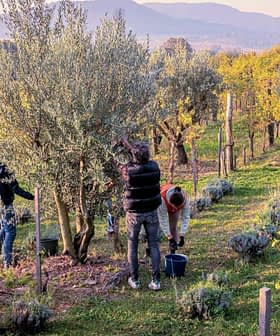The European Commission to Monitor Prices of Agricultural Goods
E.U. member states will have to send prices of products regularly to the Commission. Prices will be sent once a week for olive oil and once a month for organic olive oil and table olives.
 The EU will monitor olive oil retail prices
The EU will monitor olive oil retail pricesThe European Commission has proposed a new regulation to increase transparency in the food supply chain, requiring member states to collect and compare market rates for various food products, including olive oil. This initiative aims to empower farmers with better information to make decisions and create a fairer environment for all stakeholders involved in the food chain.
In an effort to bring fairness and transparency to the food supply chain throughout the European Union member states, the European Commission has put forward a draft for a new regulation to map how prices of food products are shaped all the way from the field to the supermarket shelves.
Enhancing market transparency will allow equal access to and greater clarity about price information, making our food chain fairer and better balanced.
The regulation will require collecting and comparing market rates which, in conjunction with other data, will highlight intermediary costs including transport, insurance, and storage. This information will equip farmers with the ability for better management and decision making that will ultimately lead to a more trustworthy environment for producers, mediators, and eventually consumers.
The proposed measure will cover the fruit and vegetables, arable crops, meat, eggs, dairy, sugar, and olive oil. It will use existing data collection systems and procedures already operating in the member states to compile the required information.
See Also:Olive Oil PricesEach member state will be responsible for gathering the buy and sell prices (both wholesale and retail) of food products such as wheat, rye, olive oil and edible olives, meat, milk, wine, rice, sugar and fruits, along with other data including the estimated and actual yield, existing stock and cultivated land. Then, all the information will be sent to the Commission headquarters in Brussels to publish it on its agri-food data portal and the E.U. market observatories.
Depending on the product, prices and the relevant information must be assembled either weekly or monthly in a timely and accurate way, the Commission explained. Specifically for olive oil the data should be collected and dispatched weekly, while for its organic counterpart and table olives the process should take place once a month.
Brussels is already monitoring olive oil prices in countries, including Spain and Italy, where prices in the former have dropped substantially in recent months, while prices in Italy continue to rise.
The European Commission has also suggested that the member states extract the necessary data from big companies and avoid putting extra burden on small and medium-sized enterprises.
Phil Hogan, the Agriculture and Rural Development Commissioner, acknowledged the crucial role of small farmers in the E.U. and the need for just procedures.
“Strengthening the position of farmers in the food supply chain has been a priority for the Commision,” he said. “Enhancing market transparency will allow equal access to and greater clarity about price information, making our food chain fairer and better balanced. These new rules will complement the recently adopted directive banning unfair trading practices in empowering weaker and smaller actors of the food supply chain and their introduction reflects the very significant public support that there is throughout the E.U. to strengthen the role of farmer in the food supply chain.”
The regulation is part of the E.U.’s wider policy to establish honest and clear transactions in the food sector, continuing from last year when legislation was issued to ban unfair trade practices such as last minute order cancellations and late payments, and introduce tools to improve farmers cooperation like written contracts for agreed prices and user-friendly risk management tools.
The proposed regulation draft will be open for public consultation until June 19. After the final text of the regulation is published in the Οfficial Journal of the European Union, all member states will be obliged to put it into force within six months.









